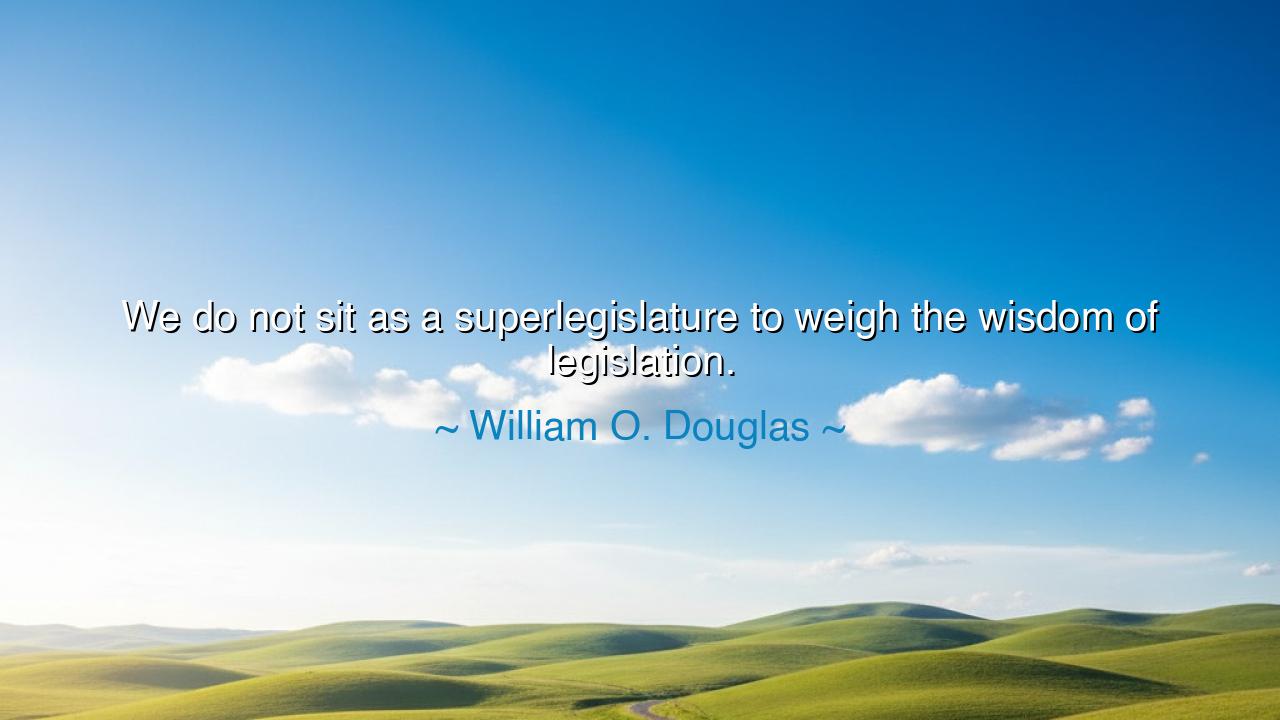
We do not sit as a superlegislature to weigh the wisdom of






“We do not sit as a superlegislature to weigh the wisdom of legislation.” These words from William O. Douglas carry with them the weight of responsibility and the limits of power. They remind us that the role of the judiciary is not to second-guess the laws passed by elected representatives, but to interpret those laws in the context of the Constitution and the principles of justice. The wisdom of legislation belongs to those who are chosen by the people, those who reflect the will of society, not to unelected judges or appointed officials. The ancient philosophers understood that authority is a shared burden, not one to be hoarded by any single institution, and this wisdom is echoed in Douglas's words.
In ancient Greece, Plato envisioned a philosopher-king who would rule with absolute wisdom and virtue, believing that only a philosopher, well-versed in the wisdom of justice, could make decisions for the good of the state. Yet, Plato also recognized the importance of checks and balances, for no one man, however wise, could be trusted with absolute power. His work, The Republic, emphasized that power must be distributed among different classes — rulers, warriors, and producers — to prevent the abuse of authority. In much the same way, Douglas reminds us that judges should not assume the role of a superlegislature, for the wisdom of laws is rooted in the will of the people, and it is not the court’s role to create laws, but to interpret them.
Consider the story of the Roman Republic, where the Senate was tasked with the responsibility of enacting laws, while the judges (magistrates) were responsible for ensuring that these laws were applied fairly. Over time, however, the balance began to shift as individuals like Julius Caesar accumulated more power and influence, threatening the very foundations of the Republic. The senators feared his consolidation of authority and sought to use the judicial system as a check on his legislation. Yet, as history shows, this shift toward judicial overreach only weakened the Republic, leading to the eventual rise of imperial rule. Douglas’s warning against judicial overreach serves as a lesson that the wisdom of the people, expressed through their elected representatives, must remain the guiding force in lawmaking.
In more modern times, Roe v. Wade stands as a key example of judicial review, where the Supreme Court was called upon to interpret the Constitution in light of evolving societal views on abortion. While Douglas was not part of this decision, his words resonate in the debates that followed, where some felt that the Court had overstepped its bounds by creating law rather than interpreting it. The wisdom of the people, expressed through the democratic process, should shape legislation, not the personal views of unelected judges. Douglas cautioned against the temptation of judges to impose their own sense of justice on the people, reminding us that the role of the judiciary is one of interpretation, not creation.
Thus, Douglas’s words urge us to respect the separation of powers, a principle rooted in the wisdom of ancient thinkers like Aristotle, who believed in the need for different branches of government to maintain balance and prevent corruption. Aristotle argued that democracy thrives when all branches are allowed to perform their duties without overstepping their bounds. In the same way, Douglas reminds us that the legislature is the voice of the people, and the judiciary must respect the laws passed by elected officials, not act as a superlegislature with the power to weigh or create laws.
In the end, Douglas’s message is a call for humility and restraint. The wisdom of legislation is not the exclusive domain of the Court, but of those whom the people have chosen to lead. Judges, while tasked with interpreting the law, must never forget that their role is to uphold the principles of justice and fairness, not to create laws or impose their own vision of what society should be.






TLNGUYEN THI LOAN
This quote raises a fundamental question about the purpose of the judiciary. If their role is not to assess the wisdom of legislation, how do they determine when a law violates constitutional principles? Does this imply a deference to the legislature even in morally contentious matters, and what are the potential risks? I’m interested in exploring how this perspective shapes debates over judicial activism versus judicial restraint in different legal systems.
MLmy le
Reading this, I’m prompted to reflect on the concept of judicial humility. How do courts navigate the line between interpreting the law and acting as a policy-making body? Are there examples where failing to weigh legislative wisdom has led to societal harm, or does strict adherence to this principle maintain proper separation of powers? I’m curious how modern judges view this balance in complex cases involving evolving social norms.
LPLinh Phuong
I find this perspective fascinating because it highlights the tension between lawmaking and judicial review. Does this mean that judges should never question the policy implications of legislation, even if it seems harmful? How can courts intervene when laws appear morally or socially problematic without overstepping their boundaries? I wonder whether this restraint strengthens democracy by preserving legislative authority or if it risks leaving critical injustices unaddressed.
PANguyen Thi Phuong Anh
This statement makes me think about the limits of judicial authority. If courts are not meant to judge the wisdom of legislation, does this mean their role is purely procedural or constitutional? How do judges reconcile situations where a law seems unjust or outdated but falls within the bounds of legality? I’m curious about how this principle balances respect for democratic decision-making with the protection of individual rights and constitutional limits.